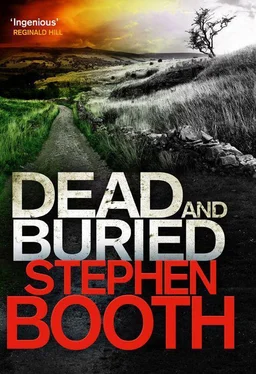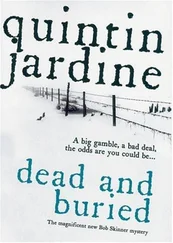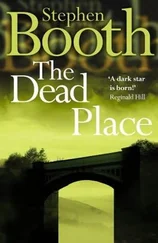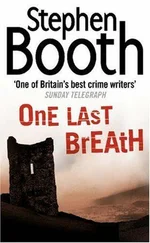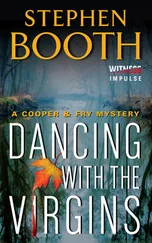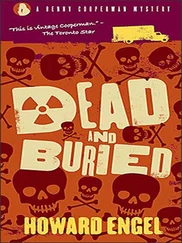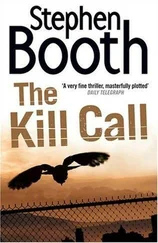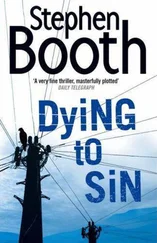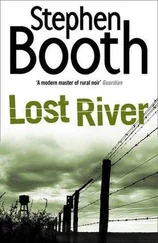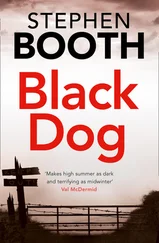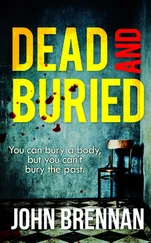Stephen Booth - Dead And Buried
Здесь есть возможность читать онлайн «Stephen Booth - Dead And Buried» весь текст электронной книги совершенно бесплатно (целиком полную версию без сокращений). В некоторых случаях можно слушать аудио, скачать через торрент в формате fb2 и присутствует краткое содержание. Жанр: Полицейский детектив, на английском языке. Описание произведения, (предисловие) а так же отзывы посетителей доступны на портале библиотеки ЛибКат.
- Название:Dead And Buried
- Автор:
- Жанр:
- Год:неизвестен
- ISBN:нет данных
- Рейтинг книги:4 / 5. Голосов: 1
-
Избранное:Добавить в избранное
- Отзывы:
-
Ваша оценка:
- 80
- 1
- 2
- 3
- 4
- 5
Dead And Buried: краткое содержание, описание и аннотация
Предлагаем к чтению аннотацию, описание, краткое содержание или предисловие (зависит от того, что написал сам автор книги «Dead And Buried»). Если вы не нашли необходимую информацию о книге — напишите в комментариях, мы постараемся отыскать её.
Dead And Buried — читать онлайн бесплатно полную книгу (весь текст) целиком
Ниже представлен текст книги, разбитый по страницам. Система сохранения места последней прочитанной страницы, позволяет с удобством читать онлайн бесплатно книгу «Dead And Buried», без необходимости каждый раз заново искать на чём Вы остановились. Поставьте закладку, и сможете в любой момент перейти на страницу, на которой закончили чтение.
Интервал:
Закладка:
Some things came round every year, as regularly as Christmas. Other types of crime, like the postbox thefts, were steadily increasing — and therefore figuring more prominently in Cooper’s preoccupations. The number of farms being targeted had gone up by sixty per cent in the last twelve months, as his brother Matt would readily testify from his recent experiences at Bridge End.
Poaching was a good example, too. It wasn’t unexpected, when jobs were being lost and everyone was feeling the effects of the downturn and financial cutbacks.
At least there had been no riots and outbreaks of looting in Edendale. That was a phenomenon that was generally confined to the cities and larger towns. Derbyshire Constabulary had sent officers to help out in London at the height of the troubles the previous summer.
‘Oh yes,’ said Murfin. ‘And the control room took a call from one of the fire crews up on the moors. The white-hat guy, you know.’
‘The incident commander.’
‘Yeah. Well he’s called in to report a break-in at an old pub. His firefighters passed it on their way to the fires. They saw a white pickup driving away, and they say some boards have been pulled off one of the doors at the back.’
‘He must mean the Light House. It’s been empty for months, ever since the last owners went bust.’
‘Oh, I know that place,’ said Murfin. ‘And you’re right — it was all boarded up last time I went past. Would they have left anything inside worth nicking?’
‘Maybe.’
‘I think it’s due to come up for auction in a few weeks’ time,’ said Hurst. ‘They must be hoping someone will take it on as a going concern.’
‘Rather them than me,’ put in Irvine. ‘Only a fool would pay out good money to start running a pub these days. Especially when the last owners couldn’t make a go of it. It’s madness.’
‘There might be equipment inside,’ said Cooper. ‘Scrap metal is still going up in value.’
‘I bet there’s no beer, anyway. Some of the lads went up there to help drink it dry on the day it closed.’
‘So what action have we taken?’
‘None yet.’
‘Inform the owners, and suggest they make the place secure.’
‘If we can find out who the owners are exactly. Right now, it might be the bank.’
‘I don’t suppose they’ll be in much of a hurry. I can’t imagine anything will be done today anyway.’
From the first-floor windows of the CID room, there was an even clearer view of the drifting smoke.
‘Has anyone been reported in connection with the fires?’ asked Cooper, knowing that he was being unduly optimistic.
‘No. We’ve only had vague sightings of quad bikes coming down from the moors. You know what it’s like, Ben.’
‘Only too well.’
Cooper thought of all the fires there had been over the years. He’d seen in a report that 345 moorland fires had been recorded in the national park since that disastrous year in 1976, affecting sixteen square miles of moor. In the Dark Peak, more than two square miles of peat still lay bare, having never recovered from the devastation.
And all of those fires had been caused by people — there were no recorded natural fires in the Peak District. The damage had often been caused by carelessness, with people dropping cigarettes or building camp fires, or as a result of controlled burns by landowners that got out of hand. But many of these fires were undoubtedly deliberate. They were the result of arson.
The sight of the moors being destroyed day by day was breaking his heart. The loss of habitats, the blackened wreckage of the hills, they tore at his heart in a way that he couldn’t fully explain. Those hills had always been his home, and he’d never wanted to live anywhere else. He recalled the lines of a song by the folk singer Ewan MacColl, written about the Peak District after the celebrated Kinder Trespass back in 1932.
Sooner than part from the mountains,
I think I would rather be dead.
Watching the fires from a distance was making him feel helpless, and the necessity of being in the office was even more irksome than usual. He had to admit that he was itchy and restless, bothered by the nagging sensation that his past was being obliterated, even as his future was being planned out, fixed down and tied up in a neat bow with a bit of wedding ribbon.
‘They’ve asked for a police investigation, though,’ said Murfin. ‘The cost of the damage is rising astronomically. There’s a request in for attendance by scenes of crime, too.’
Cooper nodded.
‘You know what?’ he said. ‘I think I’ll go myself.’
3
St Luke’s Hospice had been built in a quiet location just behind Edendale General Hospital. Patio doors from the ground-floor rooms opened on to the hospice gardens, where patients could look out at a fish pond and mature trees alive with birds and squirrels.
The room occupied by Maurice Wharton had an electrically operated positional bed, air conditioning, a flat-screen TV and en suite toilet facilities. Wharton would have felt he was staying in a nice three-star hotel, if it wasn’t for the fact that he was dying.
During his stay in the hospice, he had received the constant attentions of the palliative care nurse, the health care support workers and the occupational therapist. At intervals he was given aromatherapy massage with essential plant oils. He was becoming familiar with their powerful scents, which clung to his body. Camomile, lavender, rosemary, eucalyptus. So very different from what he’d been used to all his life — beer and cigarette smoke, the smells of cooking. He was starting to believe that death would smell of lavender.
It was two weeks since he’d moved from palliative care on a day basis, and taken up permanent occupation in St Luke’s. It was progress of a kind, he supposed — another step on the road towards his inevitable destination. And ‘permanent’ was a word that didn’t mean quite what it used to do.
Terminal care. They said the aim was to make the last few months of life relatively peaceful and pain-free. Some patients escaped the pain, he’d been told. But intractable pain was experienced in more than seventy per cent of cases with inoperable pancreatic cancer. Ninety-five per cent of patients died within five years. He’d lived most of his life being considered out of the ordinary. Now, in his last few weeks, he’d become part of the majority.
The pain in his abdomen, the loss of appetite, the yellowing in his skin and eyes, the fatigue and nausea, the insomnia. Why was the list so long? Doctors had initially related his symptoms to depression. So the pancreatic cancer had already been well advanced when the diagnosis was confirmed by CT scans of his abdomen, and surgery had become impossible. The only available treatment by then had been chemotherapy, a drug called Gemcitabine. It was ironic that the side effects of the drug were nausea and vomiting, skin rashes — and the fluid retention that swelled his body again.
Maurice Wharton had never really believed in God, or heaven. But occasionally he had a chat with the hospice chaplain, while he waited for his personal visitors at three o’clock in the afternoon. Should he be afraid of hell? Was there some endless ordeal waiting for him when this temporary suffering was over? If so, the chaplain had never mentioned it. Eternal torment only came to him in his dreams.
Wharton wondered whether he should stop trying to keep up with the news from the outside world. But sometimes, when his family visited, he couldn’t avoid it. There were things they wanted to talk about. There were the moorland fires, which had been burning for weeks and were now destroying Oxlow Moor. There was the campaign against the building of a new Tesco store in town. Nancy and the children knew how irrelevant those topics were to him, yet it was important to talk about them, as if everything was normal.
Читать дальшеИнтервал:
Закладка:
Похожие книги на «Dead And Buried»
Представляем Вашему вниманию похожие книги на «Dead And Buried» списком для выбора. Мы отобрали схожую по названию и смыслу литературу в надежде предоставить читателям больше вариантов отыскать новые, интересные, ещё непрочитанные произведения.
Обсуждение, отзывы о книге «Dead And Buried» и просто собственные мнения читателей. Оставьте ваши комментарии, напишите, что Вы думаете о произведении, его смысле или главных героях. Укажите что конкретно понравилось, а что нет, и почему Вы так считаете.
